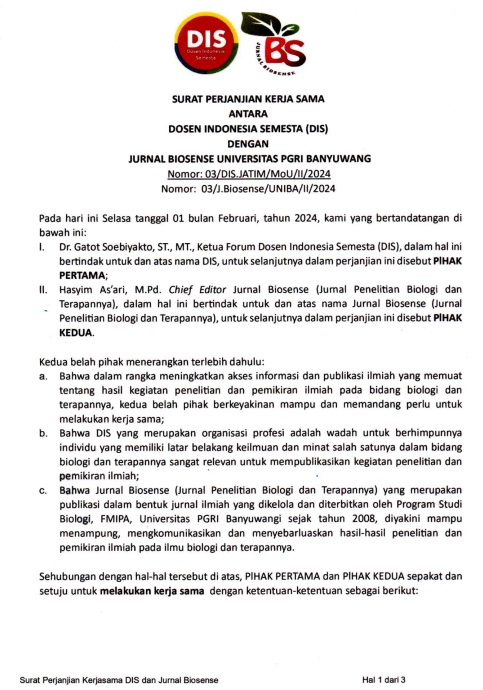AKTIVITAS ANTIBAKTERI ISOLAT KAPANG ENDOFIT DARI KULIT NANAS (Ananas comosus (L.) Meer)
DOI:
https://doi.org/10.36526/biosense.v4i02.1569Keywords:
antibacterial, endophytic mold, pineapple peelAbstract
Pineapple contains an enzyme called bromelain which is can be used as antiseptic of mouth, antibacterial, antifungal, and disinfectant. Endophytic mold is a microbe that forms colonies in healthy tissues of living organisms, generally, endophytic microbes do not cause harmful symptoms in the tissue of their host. This study aims to isolate the endophytic shell origin of pineapple peel that has acted as an antibacterial. A total of 3 endophytic capsules, Ac-I, Ac-II and Ac-III were isolated from pineapple skin using PDA media. The three isolates were purified and microscopic examinations were performed. Antibacterial testing was performed by fermentation to produce supernatant, then tested using disc method (Kirby-Bauer method) with Staphylococcus aureus and Escerichia coli test bacteria. The 3 isolates obtained only 1 isolate Ac-III isolates that have activity as antibacterial, with the inhibition zone diameter in bacterium Staphylococcus aureus 7.65 mm while in the bacterium Escerichia coli 6,9 mm.
References
Eshamah, H., Han, I., Naas, H., Rieck, J., & Dawson, P. (2013). Bactericidal Effects of Natural Tenderizing Enzymes on Escherichia Coli and Listeria monocytogenes. Journal of Food Research. https://doi.org/10.5539/jfr.v2n1p8
Faeth, S. H., & Fagan, W. F. (2002). Fungal endophytes: Common host plant symbionts but uncommon mutualists. Integrative and Comparative Biology. https://doi.org/10.1093/icb/42.2.360
Febri Walpajri, Rodesia M. Roza, F. (2014). Eksplorasi dan uji daya hambat bakteri endofit dari tanaman benalu sawo (. JOM FMIPA, 1(2), 1–10.
Fitriana, Maryam, S., Naid, T., & Maryana. (2016). Penelusuran Fungi Endofit Sebagai Penghasil Senyawa Antibiotika Dari Daun Nanas (Ananas comosus (L) Meer). J. As-Syifaa.
Fitriarni, D., & Kasiamdari, R. S. (2018). Isolation and Identification of Endophytic Fungi from Leave and Stem of Calopogonium mucunoides. Journal of Tropical Biodiversity and Biotechnology, 3(1), 30. https://doi.org/10.22146/jtbb.32477
Husniah, I., & Gunata, A. F. (2020). Ekstrak Kulit Nanas sebagai Antibakteri. Jurnal Penelitian Perawat Profesional, 2(1), 85–90. https://doi.org/10.37287/jppp.v2i1.51
Kumaran, R. S., Kim, H. J., & Hur, B. K. (2010). Taxol promising fungal endophyte, Pestalotiopsis species isolated from Taxus cuspidata. Journal of Bioscience and Bioengineering. https://doi.org/10.1016/j.jbiosc.2010.06.007
Mousa, W. K., & Raizada, M. N. (2013). The Diversity of Anti-Microbial Secondary Metabolites Produced by Fungal Endophytes: An Interdisciplinary Perspective. Frontiers in Microbiology. https://doi.org/10.3389/fmicb.2013.00065
Noverita, Dinah Fitria, E. S. F. (2009). Isolasi Dan Uji Aktivitas Antibakteri Jamur Endofit Dari Daun Dan Rimpang. Farmasi Indonesia.
Nurhidayah, N., Masriany, M., & Masri, M. (2013). Isolasi dan Pengukuran Aktivitas Enzim Bromelin dari Ekstrak Kasar Batang Nanas (Ananas comosus) Berdasarkan Variasi pH. Biogenesis: Jurnal Ilmiah Biologi, 1(2), 116–122. https://doi.org/10.24252/bio.v1i2.457
Polapa, F. S. (2015). Antibakteri dari Ekstrak Kasar Bakteri Asosiasi Karang Batu yang terinfeksi Penyakit Brown Band (Brb) terhadap Bakteri Patogen Staphylococcus Aureus dan, Skripsi FIKP.
Radji, M. (2005). Peranan Bioteknologi Dan Mikroba Endofit Dalam Pengembangan Obat Herbal. Majalah Ilmu Kefarmasian. https://doi.org/10.7454/psr.v2i3.3388
Rahmat, D., Ratih L., D., Nurhidayati, L., & Ayu Bathini, M. (2015). Peningkatan Aktivitas Antimikroba Ekstrak Nanas (Ananas comosus (L.). Merr) dengan Pembentukan Nanopartikel. Jurnal Sains Dan Kesehatan, 1(5), 236–244. https://doi.org/10.25026/jsk.v1i5.45
Rante, Herlina, Taebe, B. dan I. S. (2013). Isolasi Fungi Endofit Penghasil Senyawa Antimikroba Dari Daun Cabai Katokkon (Capsicum annuum L var. chinensis) Dan Profil Klt Bioautografi. Majalah Farmasi Dan Farmakologi.
Roze, L. V., Chanda, A., & Linz, J. E. (2011). Compartmentalization and molecular traffic in secondary metabolism: A new understanding of established cellular processes. Fungal Genetics and Biology. https://doi.org/10.1016/j.fgb.2010.05.006
Van Antwerpen, T., Rutherford, R., & Vogel, J. (2002). Assessment of sugarcane endophytic bacteria and rhizospheric Burkholderia species as antifungal agents. Proc Annu Congr S Afr Sugar Technol Assoc.

















